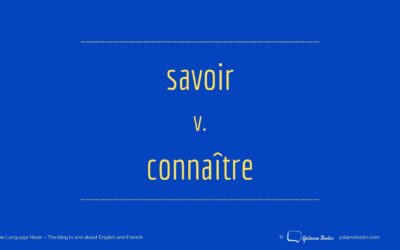The question with the French verbs paraître, apparaître and disparaître is: what auxiliary verb should be used in compound tenses: être or avoir?
These 3 verbs are a bit special because they can be conjugated with both être and avoir. However, there is a difference in intention if not in meaning. Let me explain!
Overall, the basic rule is that these verbs take avoir when the focus is on the action, and être when the focus is on the result or the outcome.
It is easy to remember if you remember this mnemonic technique:
Avoir → Action, êtRE → REsult
Now, let’s go into more details for each of these verbs, because the choice between être and avoir also depends on other elements.
Note: You will find a summary at the end of this article that gives an outline which is easier to play by for some of you.
Paraître
The verb paraître has different meanings, the main two of which are to seem or to be published.
If you use paraître to mean sembler (to seem, to look, to appear), then always conjugate it with the auxiliary avoir.
Yet, if you use paraître to mean be published, come out when talking about books for example, then you can choose between être and avoir depending on whether your focus is on the action or the result.
Look at these examples:
- Ce livre a paru en 2022 → here we use avoir to focus on the action: the fact that we add the publication date shows the focus is on the moment the book has actually been published.
- Ce livre est déjà paru → here we can use être to focus on the result, i.e. the fact that the book is now available for sale.
Apparaître
The verb apparaître can be used with either être or avoir, again depending on the focus (action or result).
However, in the second and third person singular (tu, il, elle, on), it is preferable to use être so as to avoid the hiatus:
- Tu as apparu, il a apparu → we want to avoid the hiatus (i.e. the occurrence of two vowels sounds in adjacent syllables, here for instance the two “a” sounds not separated by any consonant sound). That is why with the verb apparaître, the use of être prevails:
- Tu es apparu(e), il est apparu
Disparaître
In theory, disparaître works like the previous two verbs and can be used with either être or avoir, according to what the focus is on: action or result.
Il a disparu → focus on the action of disappearing
Il est disparu → focus on the result, i.e. describing the current state after the disappearance, the state of no longer being there.
Today, the use of être with disparaître is becoming scarce and we can observe that the prevailing usage is with avoir.
The explanations above may be what you are looking for if you are already very comfortable with French nuances. However, if you wish to avoid having to deal with subtle nuances of the French language and would like a more straightforward, simple guide as to which auxiliary to use with these three verbs, here are a few points to remember:
Memo
| Basic rule | |
| avoir | être |
| Avoir → focus on the Action | êtRE → focus on the REsult |
| paraître | apparaître | disparaître |
|
|
|
There you are! You now know which auxiliary verb to use in French compound tenses with the verbs paraître, apparaître and disparaître. Congratulations! 🙂





Don’t stop making these bilingual posts! Your insights are so valuable!
Thank you Matthew, happy to hear you are enjoying The Language Nook posts 🙂
You give us the nuances that other natives have but forget to specify in their teachings. So it’s really refreshing.
Thanks a lot for this very nice comment Matthew, such comments are always much appreciated and encouraging! 🙂